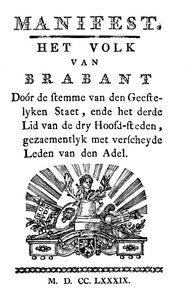| This article includes a list of general references, but it lacks sufficient corresponding inline citations. Please help to improve this article by introducing more precise citations. (May 2013) (Learn how and when to remove this message) |

|

|
| First page of the manuscript of the Manifesto (in French). |
Title page of the printed version of the Manifesto (in Dutch). |
The Manifesto of the People of Brabant (French: Manifeste du peuple brabançon, Dutch: Manifest van het Brabantse Volk) was a document made public at the start of the Brabant Revolution in 1789 proclaiming the end of the domination of the House of Austria over the Duchy of Brabant. It was first written in French and then printed in French and Dutch.
Background
In October 1789, the leader of the "Statists", Henri Van der Noot and the general Jean-André van der Meersch led a small army of patriots from the Dutch Republic where they had been in exile into the Duchy of Brabant, then under Austrian rule. The first significant town liberated was Hoogstraten and it was there that van der Noot made the declaration public to his army.
Manifesto
The manifesto was first read on 24 October 1789 in the town of Hoogstraten, though it had been published on the previous day by the Committee of Breda.
The Duke of Brabant was obliged by the terms of the Joyous Entry to respect the privileges of the people of Brabant. The element which sparked the revolution was the infringement of the terms, meaning that the declaration also declared Duke Joseph of Brabant deposed from his position.
The declaration led, in January 1790, to the establishment of the United Belgian States.
See also
- Brabant Revolution
- Committee of United Belgians and Liégeois
- Manifesto of the Province of Flanders
- Treaty of Union (1790)
References
- J. Vercruysse (1968). "Van der Noot, Holbach et le Manifeste du peuple brabançon". Revue belge de philologie et d'histoire. 46 (4): 1222–1227. doi:10.3406/rbph.1968.2752. S2CID 161764484.
External links
- Manifeste des Brabançons (in French), text of the manifesto